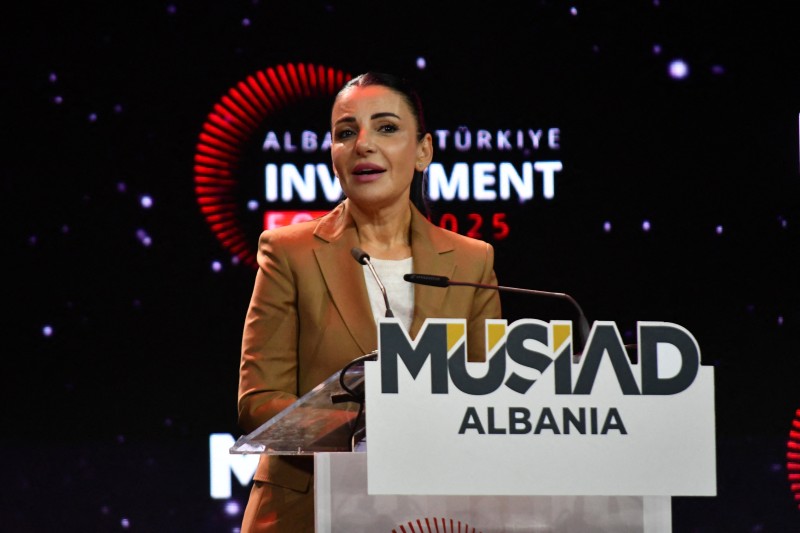Albania’s Special Court for Organized Crime and Corruption last Friday suspended Deputy Prime Minister and Infrastructure Minister Belinda Balluku and barred her from leaving the country as she faces charges of abusing major public tenders.
In its ruling, the court said Balluku is accused of manipulating procurement procedures for the 190 million euros ($219.2 million) Llogara Tunnel project and for Lot 4 of Tirana’s Outer Ring Road. Judges continued two security measures against her—a ban on leaving the country and suspension from exercising any public duty or service.
The court also kept two of her subordinates under house arrest: Albanian Road Authority (ARRSH) Director Gentian Gjyli and Albanian Energy Corporation (KESH) administrator Erald Elezi. Prosecutors say all three pose risks of flight, evidence tampering, and repeating the alleged offenses, given their roles managing public institutions and funds.
Two weeks earlier, the Special Anti-Corruption Prosecution (SPAK) charged Balluku with violating equality in tenders linked to the Llogara Tunnel project. Investigators claim she monitored and controlled every step of the project and preselected the winning bidder in breach of procurement rules. The tunnel is one of Albania’s most expensive infrastructure projects in recent years.
According to SPAK, Balluku and several procurement officials predetermined the winner of the tunnel tender, giving “unfair advantages and privileges” to a consortium of economic operators. Several of her co-defendants held senior roles at ARRSH or the Ministry of Infrastructure and Energy at the time.
Prosecutors say she exerted similar influence over the 2021 tender for Lot 4 of the Outer Ring Road, valued at 2 billion lekë ($23.85 million). Balluku is again accused of working with procurement and bid evaluation committees to steer the outcome toward a preselected consortium.
Judge Erjon Çela said there are reasonable suspicions that Balluku, Gjyli, and Elezi committed the offense of violating the equality of participants in tenders or public auctions, allegedly committed twice and in collaboration. The offense carries a penalty of one to five years in prison.
Çela ruled that the risk to the investigation is substantial because authorities are reviewing documents originating from the defendants’ own institutions and questioning officials who report directly to them. He said the defendants could interfere with or destroy evidence, noting that investigators are examining additional procurement procedures they oversaw. Their positions and access to public funds, he added, create a risk of future offenses and potential flight, given the seriousness of the charges.
Citing the Criminal Procedure Code, the court said there is no legal barrier to suspending Balluku from her ministerial and deputy prime ministerial duties. The measure does not affect her mandate as a member of parliament. Under Albanian law, the defendants have five days to appeal the decision to the Special Court of Appeals for Corruption and Organized Crime.
Balluku joined Prime Minister Edi Rama’s cabinet in 2019 and has long overseen one of the government’s largest portfolios. She is now the highest-ranking official charged by SPAK, following investigations that have already unseated several senior figures, including former Deputy Prime Minister Arben Ahmetaj, Tirana Mayor Erion Veliaj, former Health Minister Ilir Beqaj, and former Interior Minister Saimir Tahiri.
Political analyst Lutfi Dervishi told OCCRP Monday that the suspension delivered a political shock to Rama’s government, even as officials present it as evidence of the rule of law. He said the ruling “forces the government to admit that the failures are not with others, but within its own courtyard,” arguing that it reflects “an old political culture that hides behind the façade of reforms.”
“At first glance it seems as if the fight against corruption is progressing,” Dervishi said, “but in essence it shows a harsher reality—that abuse and corruption are not being fought by the executive.”
Democratic Party MP Jorida Tabaku wrote on Facebook that Balluku’s suspension is “a unique case in the world,” saying it highlights a deep “moral and political crisis” in Albania’s governance. She argued that political responsibility must begin “in the Prime Minister’s office,” adding that the case is part of “a model of governance that has produced a series of scandals, one after another.”
“Albanians deserve a governance that protects the public interest, not predetermined tenders,” she said.




